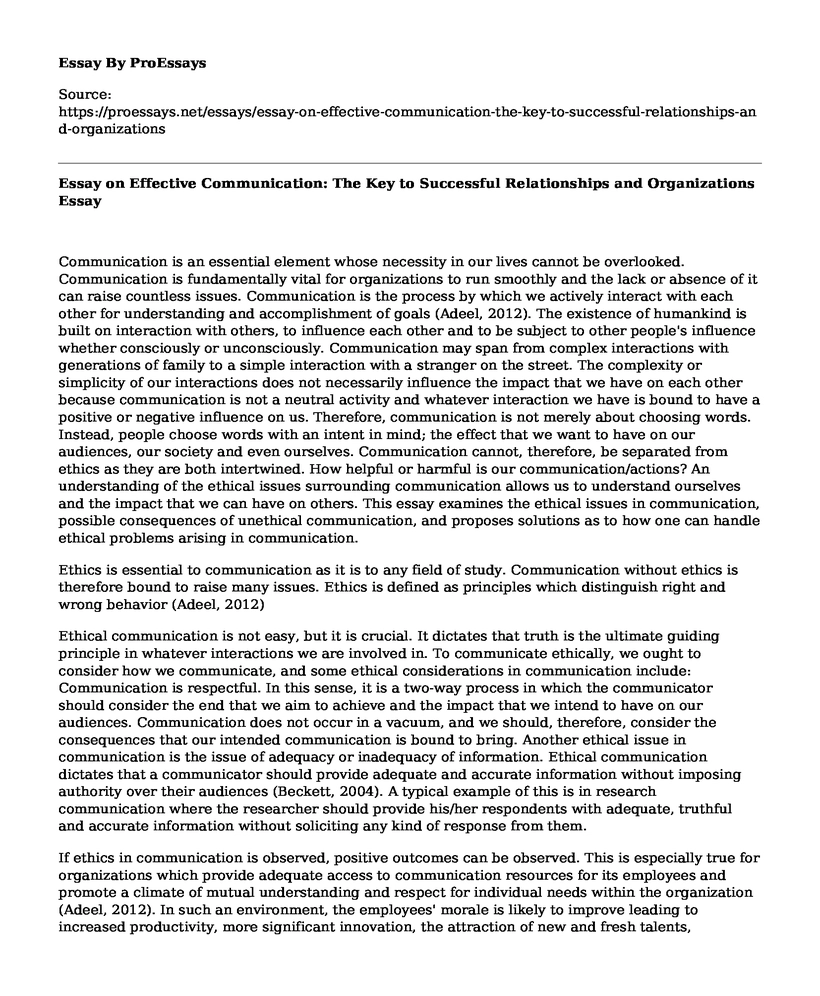Communication is an essential element whose necessity in our lives cannot be overlooked. Communication is fundamentally vital for organizations to run smoothly and the lack or absence of it can raise countless issues. Communication is the process by which we actively interact with each other for understanding and accomplishment of goals (Adeel, 2012). The existence of humankind is built on interaction with others, to influence each other and to be subject to other people's influence whether consciously or unconsciously. Communication may span from complex interactions with generations of family to a simple interaction with a stranger on the street. The complexity or simplicity of our interactions does not necessarily influence the impact that we have on each other because communication is not a neutral activity and whatever interaction we have is bound to have a positive or negative influence on us. Therefore, communication is not merely about choosing words. Instead, people choose words with an intent in mind; the effect that we want to have on our audiences, our society and even ourselves. Communication cannot, therefore, be separated from ethics as they are both intertwined. How helpful or harmful is our communication/actions? An understanding of the ethical issues surrounding communication allows us to understand ourselves and the impact that we can have on others. This essay examines the ethical issues in communication, possible consequences of unethical communication, and proposes solutions as to how one can handle ethical problems arising in communication.
Ethics is essential to communication as it is to any field of study. Communication without ethics is therefore bound to raise many issues. Ethics is defined as principles which distinguish right and wrong behavior (Adeel, 2012)
Ethical communication is not easy, but it is crucial. It dictates that truth is the ultimate guiding principle in whatever interactions we are involved in. To communicate ethically, we ought to consider how we communicate, and some ethical considerations in communication include: Communication is respectful. In this sense, it is a two-way process in which the communicator should consider the end that we aim to achieve and the impact that we intend to have on our audiences. Communication does not occur in a vacuum, and we should, therefore, consider the consequences that our intended communication is bound to bring. Another ethical issue in communication is the issue of adequacy or inadequacy of information. Ethical communication dictates that a communicator should provide adequate and accurate information without imposing authority over their audiences (Beckett, 2004). A typical example of this is in research communication where the researcher should provide his/her respondents with adequate, truthful and accurate information without soliciting any kind of response from them.
If ethics in communication is observed, positive outcomes can be observed. This is especially true for organizations which provide adequate access to communication resources for its employees and promote a climate of mutual understanding and respect for individual needs within the organization (Adeel, 2012). In such an environment, the employees' morale is likely to improve leading to increased productivity, more significant innovation, the attraction of new and fresh talents, departmental and organizational cohesion, growth and sustainability among other positive outcomes.
To observe ethical communication, it is crucial for a communicator to verify and understand the purpose that they intend to achieve and the impact that they hope to have on their audiences (Beckett, 2004). In addition to this, in case of a communication challenge, the communicator should stop, think and gauge several directions that they may take to approach the issue.
References
Adeel, A. (2012). Ethical Communication in an Organization (Doctoral dissertation, Department of Physics and Applied Mathematics, Pakistan Institute of Engineering & Applied Sciences). Retrieved from https://www.academia.edu/2188577/Ethical_Communication_in_an_Organization
Beckett, R. (2004). Communication ethics: Principle and practice. Journal of Communication Management, 8(1), 41-52. Retrieved from https://www.academia.edu/699892/Communication_ethics_Principle_and_practice
Cite this page
Essay on Effective Communication: The Key to Successful Relationships and Organizations. (2023, Feb 09). Retrieved from https://proessays.net/essays/essay-on-effective-communication-the-key-to-successful-relationships-and-organizations
If you are the original author of this essay and no longer wish to have it published on the ProEssays website, please click below to request its removal:
- Project Risk and Reward: What is the Market Rate of Return? - Essay Sample
- Toy Company Expansion: Identifying an Ideal Model for Decision Making - Essay Sample
- Bell Hooks' Call and Response: Racialization and Social Injustice Still Prevalent - Essay Sample
- Paper Example on Word Processors: Revolutionizing Business Communications
- Essay on Secure Mobile Devices: Protect Your Data & Information
- Essay Example on Organizational Culture: A Key Factor in Success and Fraud
- Free Paper on Blues Music: Shaping Identity and Community Bonds Through Song







